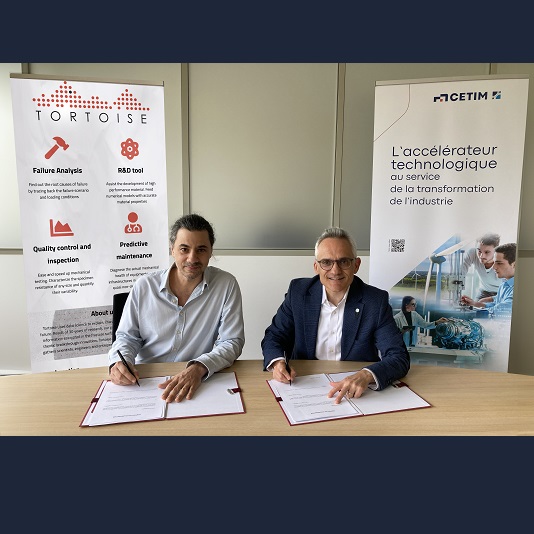Cetim and Tortoise are taking a new step forward in their relationship, which began in 2017, by signing a collaboration agreement enabling them to expand their Failure Analysis activity thanks to the integration of the revolutionary tool developed by the Paris-based start-up. This tool, tailored for the specific needs of industrials, is an ideal complement to the cutting-edge multidisciplinary support offered by Cetim. Together, they now provide a unique solution to address the challenges raised by the in-service failure of components.
A pure product of the French innovation ecosystem
Laurent Ponson, CNRS researcher at the Institut Jean le Rond d’Alembert of Sorbonne University, founded Tortoise in 2017. His objective: transfer to the industry the powerful tools of failure investigation developed in the academic world for more than 40 years. The start-up has industrialized and marketed an innovative technique, the only one of its kind in the world, called “statistical fractography“, based on patented technologies of statistical analysis of the roughness of fracture surfaces. By analyzing a small fragment of a fractured material, as little as 1 mm², the technique is able to determine its mechanical properties such as its fracture toughness or strength. Applied in the context of the analysis of a component failed in service, it provides a way to determine the mechanical loads that were applied to the component when it failed. This previous information, inaccessible through other techniques, gives rise to a deep understanding of the failure root causes. It also paves the way for a corrective process that consists in redesigning a more reliable and more durable component. It also enables the prediction of the residual lifetime of the twin components still in operation. A must have for being sure that no future failure will take place!
This method can be applied to all materials, from metal and glass to ceramics and polymers, and it is relevant from the design phase of new components to their operation phase to prevent in-service failure. Tortoise owns a cutting-edge expertise in statistical analysis and fracture mechanics, so they are in position to provide tailored solutions to all kind of challenges emerging from a wide variety of industries, from transport and energy to manufacturing. Tortoise will continue to develop advanced tools of failure analysis and predictive maintenance, and it will continue to tailor these innovative solutions through its collaboration with Cetim.
Combining technology and expertise
Tortoise had all the good reasons to arouse Cetim’s interest as its technology opens unlimited perspectives for improving and consolidating its diagnosis drawn after an in-service mechanical failure.
The collaboration contract that has just been signed builds on the complementarity between both partners, a natural step after first five years of fruitful collaboration. Cetim’s support process – that starts with an attentive listening of our partners and a first diagnosis drawn by our experts – began with a first phase of getting started with the technology and assessment of its potential, followed by the construction of a work program which enabled the validation of the reliability of the technique for various industrial application cases. Cetim and Tortoise then objectively assessed the impact of the technique on real cases of failure analysis through the comparison with the state of the art. The aim was to structure a range of solutions tailored primarily to the failure analysis market – while identifying the technical/application limitations – and to develop a joint development strategy to ensure its dissemination. The result is service unique in the world, relying on the strengths of both companies.
Today, the concrete result of this collaboration is the interfacing of this new technology to the services offered by Cetim. Initially, a scan of the fracture surface is carried out using a profilometer. The data collected is then statistically processed using the algorithms developed by Tortoise. The results obtained are then analyzed in detail and refined by Tortoise and Cetim experts in the light of all the investigations carried out, to get at a consolidated diagnosis. The results obtained make it possible to determine the root causes, but also to initiate the design of the solutions, such as component redesign assistance from Cetim and Tortoise.
This synergy enables industrials to benefit from the cutting-edges technological advances resulting from the French research. They also benefit of the expertise in mechanical engineering of the Tortoise and Cetim’s expert teams as well as a vast pool of equipment and resources. This is a beautiful example of a successful technology transfer from research to industry, in line with Cetim’s work to promote innovation and the competitiveness of mechanical engineering companies!
Tortoise develops and provides innovative technologies that improve the reliability and durability of materials. The Tortoise’s team meets the challenge of a safer and more sustainable industry in all major industrial sectors, from aeronautics and nuclear power to the luxury goods and renewable energy. Its technology extracts the mechanical data encrypted in the fracture surface of broken materials, including their mechanical strength and the conditions under which they broke. This innovation paves the way for advanced mechanical autopsies that traces back the root causes of in-service failures in its most subtle details. It also constitutes a powerful means of preventing future failures. Composed of fifteen engineers, most of whom are young doctors from very diverse scientific and cultural backgrounds, Tortoise cultivates the values of science, research, and innovation at the service of a sustainable industry that respects our environment.




